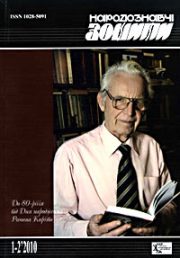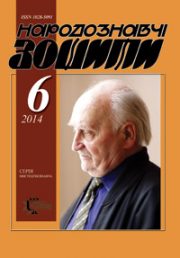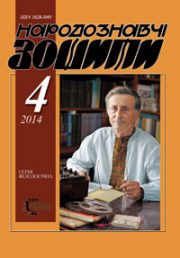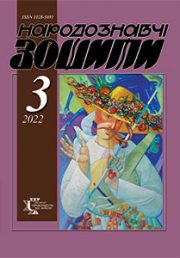The Ethnology Notebooks. 2021. № 4 (160), 953—961
UDK801.81:398.81 (477)]: 821.161.2.091
DOI https://doi.org/10.15407/nz2021.04.953
CONCEPTUAL PRINCIPLES OF RESEARCH OF REBEL SONGS
SOKIL Hanna
- ORCID ID: https://orcid.org/0000-0002-8352-2124,
- doctor of philological sciences, professor,
- Ivan Franko National University of Lviv,
- 1,Universytetska Street, 79000, Lviv, Ukraine,
- Contacts: e-mail: gan.sokil@gmail.com
Abstract. Pieces of folk art about national liberation struggles have been studied by modern folklorists only during the years of independence. The relevance of this topic is manifested not only in the cognitive study and elucidation of features of the important period in the history of the Ukrainian people for its national liberation and its depiction in folklore, but also it is a powerful resource in establishing patriotism, a symbol of insubordination, moral and ideological values. Our research deals with song genres, focusing on the conceptual principles of studying rebel songs. The proposed article is aimed at analyzing the issues of studying rebel song in the modern period, considering the main research approaches, clarifying the terminology and criteria of genre distribution; characterizing the main features of songs, their semantic content and dominant motives; revealing the features of creation and life. The article analyzes the texts in terms of genesis, ideological content, reveals the genre and thematic diversity, draws attention to the artistic features of folk works, clarifies issues related to the tradition of folklore and specific historical events, facts, traces the development, features of rebel songs, their versions. An attempt is made to compare different classifications and generalize text models. Emphasis is put on the relevance of researching rebel songs in Ukrainian folklore. The longevity of the folk song and its design for modern events, the popularity of the rebel theme among scholars and the prospects for further research are emphasized. The concepts of research of rebel songs are considered as system of modern views, ideas, attitudes, priority directions and approaches in the development of Ukrainian folklore.
Keywords: rebel song, methodological areas, genres, classification, poetics.
Received 24.07.2021
REFERENCES
- Lavryshyn, Z. (1996, 1997). UPA Songs. Litopys UPA (Vol. 25) [in Canada, in Ukrainian].
- (1992). UPA singer. Borzi za voliu Ukrainy. Lviv: Memorial [in Ukrainian].
- Kramar, R. (1995). Rebel carols: songs collected in the Western Podil. Ternopil [in Ukrainian].
- Hishchynsky, Ye. (2002). For the will of Ukraine. Antolohiia pisen natsionalno-vyzvolnykh zmahan. Lutsk [in Ukrainian].
- Demyan, H. (2003). Ukrainian songs of 1940—2000 years (historical and folklore research). Lviv; Kyiv [in Ukrainian].
- Demyan, H. (Ed.). (2006). Stepan Bandera and his family in folk songs, retellings and memoirs. Lviv [in Ukrainian].
- Demyan, H. (1992). Twenty-five rebel songs. Ukraine in the Past (Issue 3, pp. 10—42). Kyiv; Lviv [in Ukrainian].
- Demian, H., & Lawryshyn, Z. (Ed). (2001). Review: UPA. Songs. With prefase in English. Litopys Ukrayins’koyi Povstans’koyi Armiyi (Vol. 25). Toronto: Litopys UPA, 1996; L’viv: Spilne ukrains’ko-kanads’ke pidpryiemstvo «Litopys UPA». In Memoirs of the Shevchenko Scientific Society: Works of the section of ethnography and folklore (Vol. 242, рр. 634—643) [in Ukrainian].
- Sokil, H. (Koval). (1999). Rebel carols in the system of bypass calendar-ritual songs. Ethnographic notebooks, 1, 40—45) [in Ukrainian].
- Sokil, A. (2005). Study of rebel songs in the university course «Ukrainian Folk Literature». «Muse and Sword»: The National Movement in Folklore and Literary Sources (Pp. 181—189). Lviv [in Ukrainian].
- Kramar, R. (1996). Folklore of the national liberation struggle of the Ukrainian people in 1940—1950 (based on the materials of Western Podillya). Avtoref. dys.. kand.. filol.. nauk.10.01.07 — folklorystyka. Kyiv [in Ukrainian].
- Zakalska, Ya.A. (2021). Ukrainian folklore of resistance: tradition and modification, transmission the mechanisms: author’s ref. cand. philol. sciences. 10.01.07 — folklore. Kyiv [in Ukrainian].
- Biletsky, L. (1998). Fundamentals of Ukrainian literary and scientific criticism. Kyiv [in Ukrainian].
- Putilov, B.N. (2005). Folklore and folk culture. In memoriam. St. Petersburg [in Russian].







